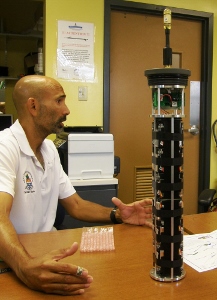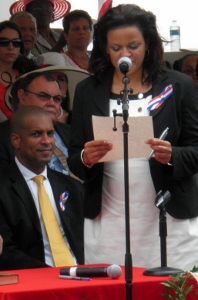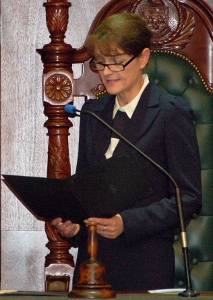Archive for September 9th, 2013

Ocean microphones pick up fish chatter for DoE
 (CNS): Researchers at the Department of Environment are better able to track and monitor fish at spawning grounds, particularly the endangered Nassau grouper, using specialist equipment that allows scientists to listen in to fish chatter. With marine resources under increasing threat from development, fishing and climate change, the DoE needs as much data as possible and the new underwater gizmos allow the researchers to pick up the sounds of all fish at the sites where the devices, commonly known as hydrophones, are located, rather than just tagged fish, as has been the case in the past. Acting like microphones that pick up sounds that fish make, the technology converts it to audio signals and measurable data.
(CNS): Researchers at the Department of Environment are better able to track and monitor fish at spawning grounds, particularly the endangered Nassau grouper, using specialist equipment that allows scientists to listen in to fish chatter. With marine resources under increasing threat from development, fishing and climate change, the DoE needs as much data as possible and the new underwater gizmos allow the researchers to pick up the sounds of all fish at the sites where the devices, commonly known as hydrophones, are located, rather than just tagged fish, as has been the case in the past. Acting like microphones that pick up sounds that fish make, the technology converts it to audio signals and measurable data.
The equipment is being used by the DoE and its partners from the Reef Environmental Education Foundation (REEF) and the Darwin Initiative to identify fish species that visit designated spawning sites in the Cayman Islands. The data will determine which species, such as Nassau Grouper, and the number of fish that are frequenting the sites. DoE Marine Research Officer Bradley Johnson said the hydrophones provide stronger data than the methods used previously.
"We have been tracking fish species via in-water monitoring and acoustic tagging for many years now. However, this allowed us to only track fish that we tagged while they passed by the monitoring stations,” Johnson said. “With these hydrophones, we can now record underwater sounds at the spawning sites every five minutes. The data is more comprehensive and ultimately, they provide greater understanding ofwhich species use the sites, and their abundance.”
Three hydrophones, which were funded by the Scripps Institution of Oceanography, are deployed off Little Cayman. A fourth, located off in Grand Cayman, was purchased through the Darwin Initiative grant, funded through the UK Department for Environment, Food and Rural Affairs. This grant has allowed the DoE to research and monitor Cayman’s marine parks for more than 25 years. A fifth hydrophone will be installed off Cayman Brac within the next few months.
DoE officials said that all of the hydrophones will be deployed for six months at a time.

Animal over-population
At last count there are now six animal welfare organisations here in Grand Cayman – not all of them registered. How is it possible that an island this size (I am only discounting CaymanBrac and Little Cayman as these entities are all based in Grand Cayman) has the need of six animal welfare operations all focused on any or a combination of all of the following (and this list is by no means exhaustive):
- Rescue abandoned or abused animals (and prevent ill treatment, cruelty and suffering of all domestic animals)
- Provide shelter (and care and attention)
- Aim to eradicate the animal overpopulation by encouraging spay and neuter
- Relocate animals to (preferably no kill) shelters in the USA
- Promotion of adoption/seek out (responsible and loving) homes
- Educate the public on responsible pet ownership
My mother was one of a group of people who helped to start what is now the Humane Society and in an interview in the ‘Nor’wester’ Magazine in 1972, she was quoted as saying that the Humane Society came about due to there being an animal over-population problem … this was 41 years ago and it doesn’t seem to have improved.
In the past 41 years how much money has been thrown at this problem? (How many relationships have been fractured and how much more money do we intend to keep throwing?) Most of this is privately funded. I believe of the six organizations only one (that being the Humane Society) receives (minimal) government assistance, and as all but one are registered charities, who presumably keep accounts, this figure is possible to obtain. But I’m not sure it will be helpful in solving what is an enormous and incredibly emotive problem that doesn’t seem to be diminishing, despite best intentions.
To give you an idea, just one of these charities that I follow quite closely is Cayman Animal Rescue Enthusiasts (CARE). I am a big fan of these guys, who possess honesty, integrity and a willingness to ‘be the change you want to see’. (I’m not saying the others don’t; I am simply focusing on CARE because I know the most about these guys.) In addition, with no government subsidy, and with no premises or paid staff they have accomplished the following in the short time they’ve been operating as a registered charity (late 2009):
- 1,011 spay and neuter surgeries for community dogs and cats
- 272 dogs and puppies have been transferred overseas
- 72 dogs have been adopted into loving and responsible homes here on Island
As much as it’s been helpful to forge relationships with (at times no kill) shelters overseas and good homes have been found for some of our ‘Caymanian’ breed dogs, this is not solving the problem over the long term. It’s a short term fix and it seems that as if each new organization pops up, there’s another reason for another irresponsible pet owner to shirk their responsibility.
It seems we’re almost enabling this culture of irresponsible pet ownership and giving folks a free pass to leave the Island without having to take their animals with them because of the big hearts involved – ‘someone will always take care of them’. Equally, there are those who aren’t leaving the Island but are leaving their animals in very inhumane conditions and may as well be considered an ‘absentee owner’. And so, every time someone is required to take care of an animal that’s been abandoned or mistreated by those irresponsible amongst us, it detracts resources (both time and money) from the true purpose, which is to educate the population and eradicate the over-population problem.
What is needed is government legislation (and enforcement). A dog breeding legislation must be in place, and it must be one that enforces breeders to hold a Trade & Business License. In addition, and in order to obtain and maintain such Trade & Business License, the licensee would be subject to home or businessproperty inspections, etc. This will cost money to implement and oversee and this is why there is a price to hold a Trade & Business license that is renewable annually. But this has got to cost less to oversee than is currently being spent by both government and the private sector in the funds being used to fund six different (yet similar) directions.
In addition, the government must bring back the dog licensing registration, preferably with a fee scale depending on whether the dog being brought in is to breed or not, and if the dog isn’t being brought in to breed (by a licensed breeder) then surely the dog should be brought in already spayed or neutered.
If this were to take place, there would be no need for these organizations to continue cleaning up the mess that is being allowed to continue (and in fact seemingly multiply) and the money that is being bled into and out of them might be channeled to one of the many other worthy causes that have yet to be fixed with something as simple as legislation and oversight.
In the meantime, and until legislation and oversight is in place, all of these registered charities need our help, and so I would encourage you to consider making a donation to any or all that speak specifically to you. But equally important, I would encourage us all to reach out to our government representatives to see if we can encourage change.
I realize we have enormous problems to tackle and this may be the least of them in some of your minds but please remember the quote by (I believe it was) Mahatma Ghandi, who said, “The greatness of a nation and its moral progress can be judged by the way its animals are treated.”

Rivers’ Africa trip official
 (CNS): The minister for education was the official government representative on her recent trip to theCommonwealth Parliamentary Association Annual Conference in South Africa, the premier’s office has confirmed. This means that the cost of the trip will be partially paid for from the public purse. Although the office stated that Tara Rivers was taking leave when her counsellor Winston Connolly was sworn in as the temporary minister last month, officials admitted on Friday that Rivers was in fact government’s official delegate at the conference in Johannesburg. Although Connolly had originally been earmarked to go, Rivers took the spot instead because she missed an earlier CPA meeting in July as a result of the election petition challenge.
(CNS): The minister for education was the official government representative on her recent trip to theCommonwealth Parliamentary Association Annual Conference in South Africa, the premier’s office has confirmed. This means that the cost of the trip will be partially paid for from the public purse. Although the office stated that Tara Rivers was taking leave when her counsellor Winston Connolly was sworn in as the temporary minister last month, officials admitted on Friday that Rivers was in fact government’s official delegate at the conference in Johannesburg. Although Connolly had originally been earmarked to go, Rivers took the spot instead because she missed an earlier CPA meeting in July as a result of the election petition challenge.
“CPA government Minister Rivers is attending the Commonwealth Parliamentary Association Annual Conference, including the Commonwealth Women Parliamentarian meeting as the official delegate representing the government,” a statement from the premier’s office released Friday stated. “This is an annual conference that the Cayman Islands branch of the CPA sends delegates to every year – one from the Government, one from the opposition. She was invited to attend the CPA regional conference earlier (in July) but was not able to attend that one, so the opportunity arose to attend this one, as the official delegate.
“The cost of the trip, as all such CPA conferences, is taken care of by the CPA. She intends to issue a press release covering the trip upon her return,” the press secretary to the premier added.
It is understood that the international CPA covers most of the cost for Cayman’s official CPA representative, Juliana O’Connor-Connolly, the speaker of the House, who was also in Johannesburg for the conference and who returned to the island by Friday in time for the swearing in ceremony for the new governor, Helen Kilpatrick.
Rivers was absent from the welcome events for Kilpatrick but is expected to be back in the ministry Monday. Opposition Leader McKeeva Bush, who was also on the trip, told CNS last week that the funds given to the local CPA come from the public purse.
With a new government travel policy, the premier has recently revealed that delegations on all official travel are being reduced to the bare minimum of delegates and officials are required to travel premium economy and not business class unless they pay for their own upgrades.
CNS has contacted the relevant government authorities to make a Freedom of Information request for the cost to local coffers for the Cayman delegation’s Africa trip.

Kilpatrick plans ‘light touch’
 (CNS): The new Cayman Islands governor intends to operate with a light touch, she said as she was sworn into office Friday, using the same expression as her predecessor, Duncan Taylor. However, Taylor stated just beforehe left the islands that although that had been his intention, it did not turn out to be the case. In her speech to Legislative Assembly members and guests, Helen Kilpatrick also said that while it was her goal, it could change if necessary, as she emphasised the mantra of good governance. Admitting she had a lot to learn and speaking directly to the people, the twelfth governor of the islands and the first woman in that role said she would “work tirelessly to earn your trust”.
(CNS): The new Cayman Islands governor intends to operate with a light touch, she said as she was sworn into office Friday, using the same expression as her predecessor, Duncan Taylor. However, Taylor stated just beforehe left the islands that although that had been his intention, it did not turn out to be the case. In her speech to Legislative Assembly members and guests, Helen Kilpatrick also said that while it was her goal, it could change if necessary, as she emphasised the mantra of good governance. Admitting she had a lot to learn and speaking directly to the people, the twelfth governor of the islands and the first woman in that role said she would “work tirelessly to earn your trust”.
Having sworn to well and truly serve the people of the Cayman Islands, Kilpatrick said she was committed to a partnership between the islands and the UK to create a safe, successful and sustainable future for the country.
She said her priority was to get to know the people and the pressing issues that concern them, including the problem of crime, as she pointed to the recent reports of robberies and the increase in burglaries. Kilpatrick said she welcomed government's move to introduce standards in public life legislation before the year was out and said government needed to operate with “honest and integrity”. She singled out the environment and the rights of woman as areas of interest to her outside her direct areas of responsibility .
Although Kilpatrick is Cayman’s first female governor and only the second in Britain’s territories, it is her career history in the Home Office and local government in the UK, rather than the Foreign Office, which sets her apart from previous governors. However, while she noted her experience in public finances, she said that the stewardship of public money was a shared responsibility that stretched across the entire civil service.
Her first address in Cayman came following her arrival to pomp and ceremony at Owen Roberts International Airport on Cayman Airways. She was sworn in by Chief Justice Anthony Smellie and welcomed in the Legislative Assembly by Premier Alden McLaughlin and Deputy Governor Franz Manderson, who handed back the country's top post, having acted as governor since Taylor departed for Mexico.
Manderson picked up on some of the issues relating to the work ahead in the civil service and in particular the need for accountability.
“Your predecessor mentioned the need to improve accountability across the service. Although we have made significant progress in this area, we agree that more must be done and I look forward to discussing this matter with you and to seek your advice,” he said.
Following the formalities inside the LA, Kilpatrick inspected the police guard of honour before heading back to Government House. She then attended a special local reception at Pedro St James, with a taste of local hospitality and a chance to meet Caymanians outside of officialdom.

School year starts with news of improved exam results
 (CNS): Chief Education Officer Shirley Wahler revealed significant improvements in overall student results for the end of the last school year. Speaking at the Annual Education Professionals’ Welcome, the head of education announced the best external exam results since the National Curriculum was introduced five years ago. The pass rate has doubled since 2008, when just 29.6% of students gained five or more ‘Level 2’ passes (CXC CSEC Grades I – III or GCSE Grades A* – C or equivalent). this year that figure has risen to 62.7%. Acting Chief Officer Christen Suckoo delivered the official welcome at the Mary Miller hall, where over 500 education professionals met.
(CNS): Chief Education Officer Shirley Wahler revealed significant improvements in overall student results for the end of the last school year. Speaking at the Annual Education Professionals’ Welcome, the head of education announced the best external exam results since the National Curriculum was introduced five years ago. The pass rate has doubled since 2008, when just 29.6% of students gained five or more ‘Level 2’ passes (CXC CSEC Grades I – III or GCSE Grades A* – C or equivalent). this year that figure has risen to 62.7%. Acting Chief Officer Christen Suckoo delivered the official welcome at the Mary Miller hall, where over 500 education professionals met.
“Educators play a significant role in the minds and memories of students they’re in contact with,” said Suckoo. “They are mentors and relationship builders, instrumental to student engagement and human development.”
The welcome brought together principals, teachers, counsellors, ministry officials and department staff for an opportunity to converse, welcome new members and set the stage for the new school year’s objectives and expectations.
Education Minister Tara Rivers highlighted the past year's progress and addressed existing challenges. She pointed to the need for persistent focus on numeracy and literacy, as well as life skills to develop healthy choices, conflict resolution and crime prevention and intervention.
“We will continue to build on the solid foundation and existing framework of the Strategic Plan for Education 2012-2017 and we will further develop a child-centred approach with a curriculum which addresses gifted and challenged students,” said Rivers. “Change is constant in a learning environment, and therefore we too need to evolve to ensure a robust future for our childrenand our country.”
This student centred approach was reinforced when 6-year-old George Town Primary School student Trevor Carmola Jr offered the opening prayer and Lighthouse School student Jared Myles sang the National Song.
The newly appointed deputy chief officer, Dr Tasha Ebanks Garcia, spoke about improving opportunities for students to acquire more qualifications and develop skills for independent learning so that they could be positioned for academic, professional and personal success. She highlighted importance of the recently introduced Cayman Islands Further Education Centre (CIFEC) in providing opportunities to students who need to close the gap between high school and college, as well as opportunities for those who are preparing for advancement to higher level studies.
“CIFEC provides opportunities through various means for a student to build the bridge to future learning, “said Dr Garcia. “It opens a door for those that may have been struggling academically and for those who have a strong academic background it provides opportunities to gain internationally recognized qualifications that support the progression to the next levels of education. At CIFEC students learn life skills as well as gain skills in academic and technical/vocational areas, empowering them to take control of their future.”
The educators were also told about the Golden Apple Awards in November, sponsored by the Chamber of Commerce in partnership with the Ministry of Education to celebrate outstanding educators.
Meanwhile, 15 newly qualified Caymanian teachers who have joined the government education system took part in an induction session at the Government Administration Building. Since the education minister was in South Africa for the CPA meeting, it fell to her counsellor in the ministry, Winston Connolly, whose mother was a teacher, to welcome them on board.
“The quality of teaching is the most powerful predictor of student success and the Ministry of Education is committed to ensuring that newly qualified Caymanian teachers are equipped with tools that will help them to be effective and successful,” Connolly told them.
The NQT Induction Programme is an initiative of the ministry designed to support new Caymanian teachers by providing a year-long bridge between initial teacher education, and a career in teaching. Over the course of the year the teachers will attend monthly workshops targeting specific issues such as classroom management, literacy strategies, numeracy strategies and assessment techniques.
“We recognise that there are unique challenges that teachers face during their first year of teaching, and we want to ensure that our newly qualified Caymanian teachers are provided with early and on-going support that is well planned to meet their needs,” Suckoo said. “By providing such support, we are setting them on the right path to meet the competencies set out in the Cayman Islands National Professional Standards for Teachers, and thereby ensuring that our students receive a quality education.”